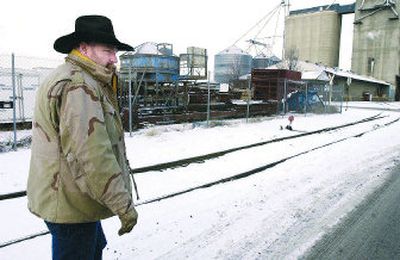Thieves unplugged from reality

Hot on the frozen trail of copper thieves, Royce Lynch climbed through a gaping hole cut in a chain-link fence, studied the drag marks of ill-gotten gains too heavy to carry, then shared some observations torn straight from the probable script of CSI Spokane Valley.
These criminals, according to the freight truck dispatcher in the Yardley industrial yards, were stupid.
“They didn’t have to cut a hole in our fence,” said Lynch. “We have an open lot. They could have walked in and out of the front of it.”
They might have even showed up during regular business hours and knocked on the door. Arlo Huber and Son Trucking, the company for which Lynch works, has made a practice over the years of helping the less fortunate residents of this West Valley neighborhood, which might, without much exaggeration, be described as too brutal for knapweed. It’s a place where the rattle of diesel tractors and squeal of frozen metal long ago replaced the sounds of birds. Down the curbless street there are bulk fuel tanks larger than any water tower in the region. Trains lumber through the area on an iron couplet more than 30 lanes wide.
The copper thieves that hit Huber stole 15 extension cords used to keep the company’s trucks from freezing and made many of the cords unusable by cutting them from the truck’s engine blocks. They hit several Yardley businesses that night when the temperature hovered just above zero. Then they followed up their felony theft with some criminal gluttony because the 300 pounds of stolen cords were too much to drag. They abandoned much of their load in some bushes a block from the crime scene.
What got hauled away showed up a few days later at a recycling center around the corner from Huber.
One of the company’s trucks froze up solid. The others were resuscitated after Lynch, a large man in a camouflage coat and cowboy hat, ran out to buy replacement cords and got the trucks plugged in. The losses could have been horrendous had Huber’s drivers been left in the lurch and the company unable to honor its contracts to deliver mostly agriculture-related products.
The ill will created by the thefts will likely make the neighborhood a little more hard-edged, even at Huber, where workers keep aluminum stacked in the shop for the neighborhood can man and an extra hamburger patty in the fridge for any wanderer lured inside by the smell of the company’s barbecue grill.
There was plenty more than copper wire to steal in the neighborhood that night, but right now the metal is selling for $2 a pound if it’s stripped, although Lynch suspects the thieves were going to sell extension cords as is, in which case the price offered would have dropped to 80 cents a pound.
He wonders if the lower price could have been worth the trouble the thefts caused, or the struggle that must have taken place lugging 300 pounds of wire through fence holes and down streets for a few blocks on a night when frostbite was probable.
“If they put half of that effort into a real job?” Lynch said, shaking his head.